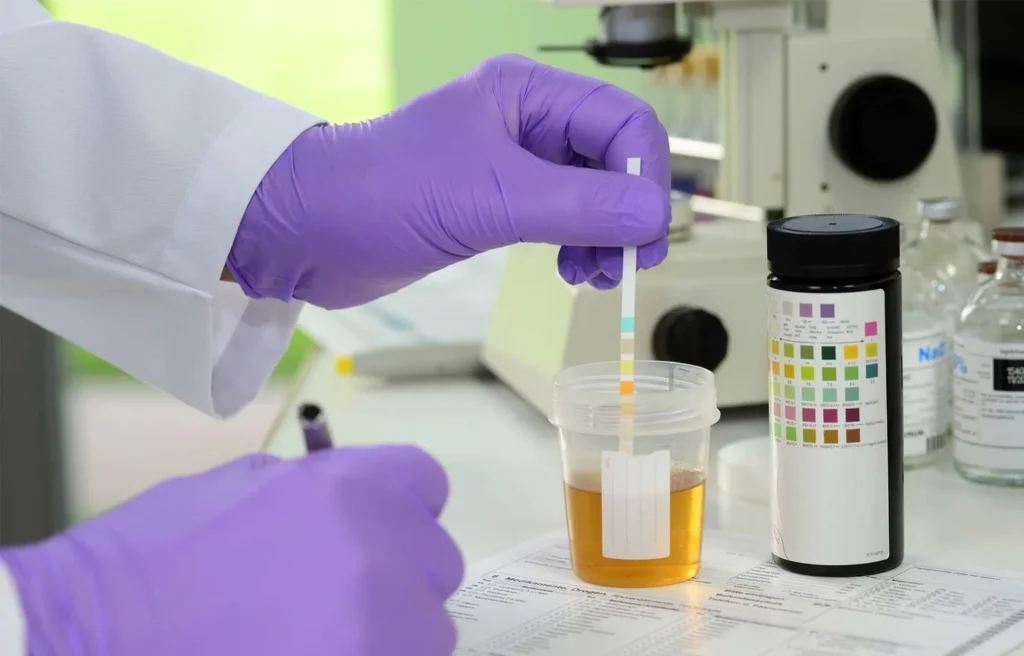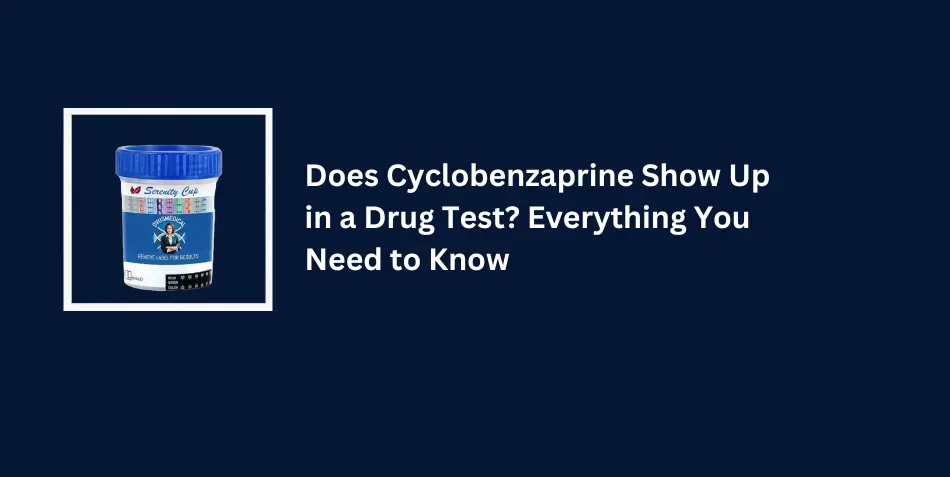Cyclobenzaprine is a muscle relaxant commonly prescribed to relieve muscle spasms and pain associated with injuries or musculoskeletal conditions. While it’s an effective medication, many people wonder, does cyclobenzaprine show up in a drug test? Additionally, questions like can cyclobenzaprine cause a false positive? are frequently asked, especially by those undergoing workplace or legal drug screenings. In this article, we’ll explore these questions in detail, providing you with accurate information and insights to help you better understand how cyclobenzaprine interacts with drug tests.
Understanding Cyclobenzaprine: Uses and Effects
Cyclobenzaprine, sold under the brand name Flexeril, is a prescription medication that works by blocking nerve impulses (or pain sensations) sent to the brain. It’s typically prescribed for short-term use (up to 2-3 weeks) to treat muscle spasms caused by acute conditions like back pain or injuries.
While cyclobenzaprine is not classified as a controlled substance, it’s important to note that it can have side effects, including drowsiness, dizziness, and dry mouth. Because of its potential for misuse, some individuals may be concerned about whether it will appear on a drug test.
Does Cyclobenzaprine Show Up in a Drug Test?
The short answer is: it depends on the type of drug test being administered. Most standard drug tests, such as the 5-panel or 10-panel tests, are designed to detect illicit substances like marijuana, cocaine, opioids, amphetamines, and PCP. Cyclobenzaprine is not typically included in these panels because it’s not considered an addictive or illegal substance.
However, specialized drug tests, such as those used in forensic or medical settings, may screen for cyclobenzaprine. These tests are less common and are usually only conducted if there’s a specific reason to suspect cyclobenzaprine use.
If you’re concerned about “does cyclobenzaprine show up in a drug test,” it’s always a good idea to disclose any prescription medications you’re taking to the testing administrator. This can help avoid misunderstandings or false assumptions about your test results.

Can Cyclobenzaprine Cause a False Positive?
One of the most common concerns is whether cyclobenzaprine can trigger a false positive on a drug test. The answer is: yes, it’s possible, but rare. Cyclobenzaprine is structurally similar to tricyclic antidepressants (TCAs), such as amitriptyline. Some drug tests may mistakenly identify cyclobenzaprine as a TCA, leading to a false positive result.
If you’re taking cyclobenzaprine and are required to undergo a drug test, it’s crucial to inform the testing facility about your medication. Most labs will perform additional confirmatory testing, such as gas chromatography-mass spectrometry (GC-MS), to rule out false positives and ensure accurate results.
Factors That Influence Drug Test Results
Several factors can influence whether cyclobenzaprine shows up on a drug test or causes a false positive:
- Type of Drug Test: As mentioned earlier, standard drug tests are unlikely to detect cyclobenzaprine, but specialized tests might.
- Metabolism and Dosage: How quickly your body metabolizes cyclobenzaprine and the dosage you’ve taken can affect detection.
- Testing Sensitivity: Some tests are more sensitive than others and may be more likely to produce false positives.
- Cross-Reactivity: The chemical structure of cyclobenzaprine can sometimes cross-react with other substances, leading to false positives.
How Long Does Cyclobenzaprine Stay in Your System?
If you’re worried about “does cyclobenzaprine show up in a drug test,” it’s helpful to know how long the drug remains detectable in your system. The detection window depends on several factors, including your age, metabolism, and frequency of use. Here’s a general guideline:
- Urine: 3-4 days
- Saliva: 1-2 days
For most people, cyclobenzaprine is eliminated from the body within a few days. However, chronic use or higher doses may extend the detection window.
Tips for Avoiding False Positives
If you’re concerned about “can cyclobenzaprine cause a false positive,” here are some steps you can take to minimize the risk:
- Disclose Your Medications: Always inform the testing facility about any prescription or over-the-counter medications you’re taking.
- Request Confirmatory Testing: If your initial test results are positive, ask for a more specific test to confirm the findings.
- Keep Documentation: Carry a copy of your prescription or a doctor’s note to verify your use of cyclobenzaprine.
Why Choose Our Drug Testing Products?
At Ovus Medical, we understand the importance of accurate and reliable drug testing. Whether you’re an employer, healthcare provider, or individual, our drug testing products are designed to deliver precise results you can trust. From urine tests to advanced confirmatory testing kits, we offer a wide range of solutions to meet your needs.
Our products are:
- FDA-approved and CLIA-waived
- Easy to use and interpret
- Designed to minimize false positives
With our drug testing kits, you can ensure compliance, safety, and peace of mind.

Final Thoughts
So, does cyclobenzaprine show up in a drug test? In most cases, it won’t appear on standard drug tests, but specialized tests may detect it. Additionally, while rare, can cyclobenzaprine cause a false positive? Yes, due to its similarity to tricyclic antidepressants. By understanding how cyclobenzaprine interacts with drug tests and taking the necessary precautions, you can avoid unnecessary complications.
If you’re in need of reliable drug testing products, explore our collection today. At Ovus Medical, we’re committed to providing you with the tools you need for accurate and trustworthy results.
FAQs
1. Does cyclobenzaprine show up on a 10-panel drug test?
No, cyclobenzaprine is not typically included in a 10-panel drug test, which screens for illicit substances like cocaine, marijuana, and opioids.
2. Can cyclobenzaprine cause a false positive for opioids?
No, cyclobenzaprine is more likely to cause a false positive for tricyclic antidepressants than opioids.
3. How long should I stop taking cyclobenzaprine before a drug test?
If you’re concerned about detection, consult your doctor. Generally, cyclobenzaprine is eliminated from the body within 3-4 days.
4. Are there any legal implications if cyclobenzaprine shows up on a drug test?
No, cyclobenzaprine is a legal prescription medication. However, it’s important to disclose your prescription to avoid misunderstandings.
By following these guidelines and using our drug testing products, you can ensure accurate results and maintain compliance with testing requirements. If you have further questions, feel free to reach out to our team for expert advice and support.

